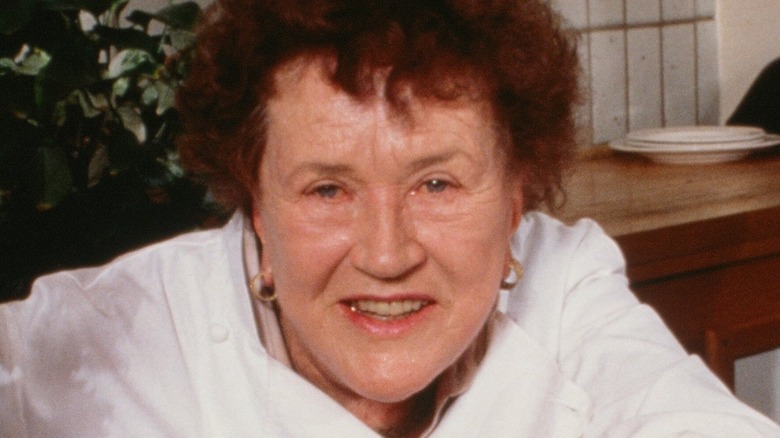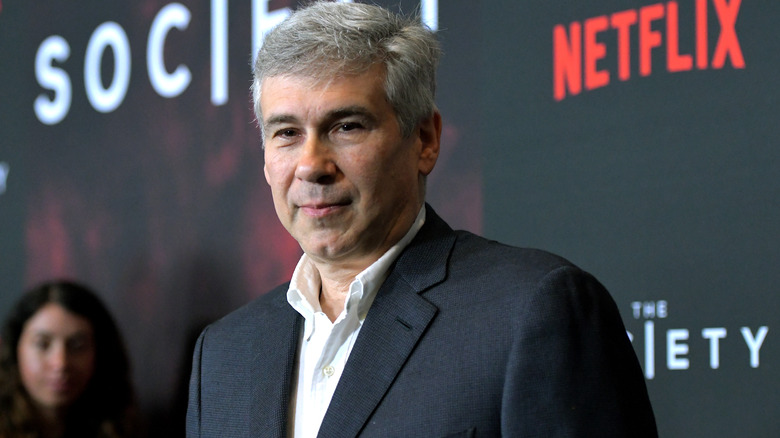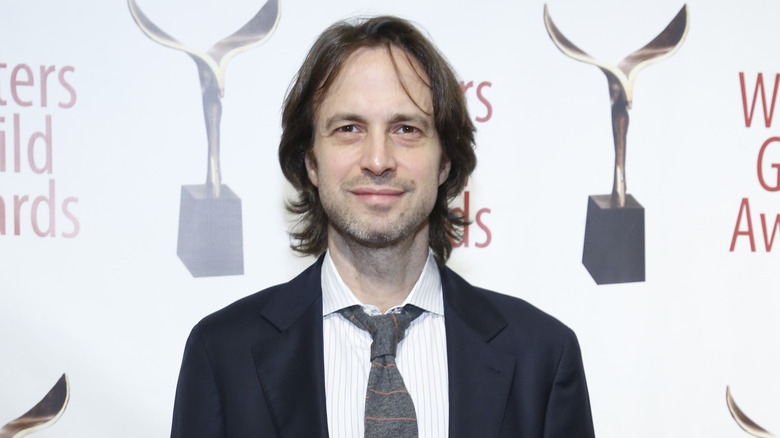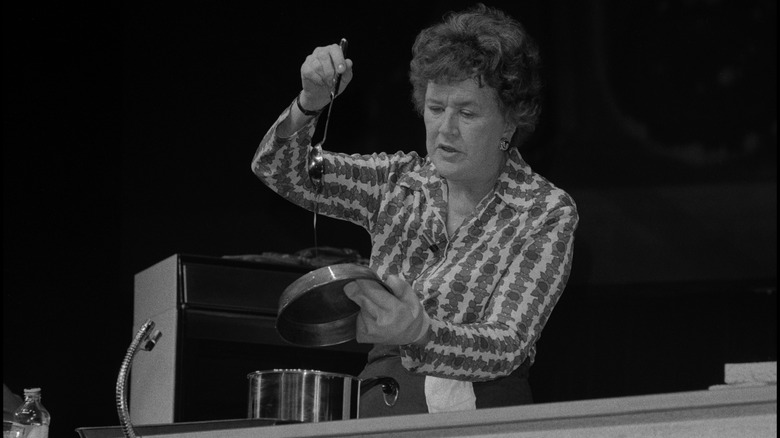Chris Keyser And Daniel Goldfarb Bring Julia Child's Lessons To HBO Max's Julia - Exclusive Interview
It's no secret that Julia Child not only had a dynamic and illustrious career that inspired not only the next generation of professional chefs and her contemporaries, but also many books and films about her life. But one thing that sets the latest series based on Child's life, HBO Max's "Julia," is the period of her life in which it is set. To learn more about the series, Mashed spoke with "Julia" creator Daniel Goldfarb and Executive Producer Chris Keyser.
Together, they talked about what it was like behind the scenes and some of the challenges they faced while shooting and making the limited series. The pair even explained some of the creative choices that were made during the series to bring a new perspective of Child's life to viewers in the new series. If one thing is clear, it's that this new drama and comedy is meant to bring a little light to all of Child's generations of fans.
Goldfarb and Keyser on making Julia
Can you tell us about working on Julia?
Daniel Goldfarb: It has been a four year process, but a really thrilling one. We had a bunch of stops and starts along the way, including a global pandemic that shut us down an hour before the table read of our pilot. It is incredible that with all of these obstacles, we got to make this show with this incredible group of people, both in front of the camera and behind the camera. I think Chris and I both couldn't be more proud of it.
Can you speak to how or why Julia focuses on this particular portion of Julia's life, working on the television program rather than her first cookbook?
Chris Keyser: There were a lot of opportunities we saw in this chapter of her life to talk about things we wanted to talk about. First of all, it's a period in which the marriage between Julia and Paul changes fundamentally. Up to this point, although she's written "Mastering" and things have begun to change in that way, she really followed Paul's life. She was [in the passenger seat] to a remarkable life that he had. From this point on, he takes that second seat in the marriage.
We wanted to tell the story of the evolution of the marriage from the old-fashioned, wonderful, loving, old-fashioned '50s kind of marriage, a Lucy and Ricky kind of marriage, to something that felt more like a modern marriage — and watch Paul in particular, and Julia, who understood what it meant to take someone along, navigate what it meant to allow this woman to shine. That's the first thing.
The second thing is the beginning of her second act, and it's a story about second acts. We were very interested in that and the remaking of yourself, no matter what age you are. Third, it's her time back in America. We wanted to talk about all the things that were happening in America through the '60s and the '70s: the changes in food culture, the development of public television, the rise of celebrity, the increasing importance of feminism, and other movements of change in society that Julia had an interesting relationship to.
Goldfarb and Keyser on the challenges of shooting
Can you tell us what the dynamic was like while shooting?
Goldfarb: We were very lucky because everyone wanted to be there. Almost all our actors are theater actors. They were letter-perfect. They were really prepared. It was very moving for all the writers to see how much all of our actors and then all of our guest stars [were prepared]. Sarah, at the top of the call sheet, is such a professional and worked so hard. Everyone else wanted to be there for her and support her and be just as prepared as she was.
We were doing it in such a strange, fraught time in the world. We made the pilot during the election, before vaccines. It was like "The Truman Show." They were in their period clothes and these gorgeous sets and Chris and I were wearing hazmat suits and shields and gloves. It was surreal. It made it a little bit lonelier, but ultimately, everyone was so focused and so committed and it comes through, so it was a wonderful experience.
It was amazing to see Bebe and David working together again all of these years later, and it seemed like they had never been apart.
Keyser: Yeah. They love each other, and it's a different kind of story they got to tell with each other also. There's beautiful, dramatic moments because they're such good dramatic actors as well. That was fun. We don't point that out overly much because we know it's not a reunion, but it's impossible for an audience not to enjoy that. They definitely did.
What was the most challenging part of filming this series?
Goldfarb: COVID ... Because we are telling an intimate story and yet we all had to do it six feet apart, right up until the camera rolled. Rehearsing with masks on, all of that was hard and added another layer to what's already a miraculous process in terms of the amount of hoops you have to jump through to make something, get to the finish line. That was probably our biggest obstacle.
Keyser: We're not different from any period piece. We had incredible people behind the scenes. Donna Bloom, our producer, Patrizia von Brandenstein, our production designer who won an Academy Award for Amadeus, our costume designer, [and] our DP, who were so committed to getting it right. That's a painstaking thing because there's not a thing that we shoot that was [available]. Nothing from the 1960s is there. Everything has to be designed. Every tile on the floor, every napkin, and chair, it's all designed. Daniel's done that before on ["The Marvelous Mrs. Maisel"] and I've done it too on other shows, but it is a different process to make a period show.
Behind the scenes of Julia with Keyser and Goldfarb
If you could have Julia Child prepare one dish for you, what would it be?
Goldfarb: There's so many amazing ... some of her desserts, like her chocolate souffle or ... I'm a big dessert person, so maybe ... Although [there's also] her French onion soup and her coq au vin. There's a lot of them, but maybe one of those great, amazing French desserts.
Keyser: For me, because I grew up in a culture/family that didn't cook very much, but once or twice we made coq au vin, that it might be that. I don't know how good it was, so I'd like to have a reference point. TTo cook that for me just once, it would both bring back memories and maybe the definitive version.
In the show, it was interesting to see everyone going and taking bites of what she had prepared.
Goldfarb: We did that on set, just like they did on the set of "The French Chef." That was famous that after the show, everyone dug in.
Are there any other behind the scenes details you can give?
Keyser: That's the best part of it. Christine, our food stylist, had to make — as Daniel always says, if Julia cut a piece of cake once, we needed 20 of them and that left a lot of food over for everyone to eat. Every day was a new feast. No matter where we were, a movable feast.
Goldfarb: We would have at our craft service table, there would be La Croix bottles, but also chocolate souffles, French onion soup. It was incredible.
Keyser: Steak frites.
What do you hope viewers will take from the show?
Goldfarb: I hope they take a lot from the show. I hope they're inspired by Julia. I hope they're inspired by not just her success on television, but how she navigated her relationships and how she continued to feel full of life and how she continued to live life with a sense of joy, a sense of mystery, a sense of surprise. We can all ... Sarah says she's a tonic, and she is, and we can all learn from her. Again, all the characters in the show, all of them are aspirational characters. There's not one character on "Julia" that has a lazy bone in their body. All of them know they have limited time here and they're going to do the most with what time they have. That's inspiring for everybody.
Keyser: One of the things we thought we were going to say to people is that food and cooking is one of the best ways to reinforce family and community, but it turns out that we're telling it to a population that spent the last two years cooking, locked up together, cooking and eating. It may be a lesson they've already learned.
The first three episodes of "Julia" are now streaming on HBO Max. New episodes premiere on Thursdays.



